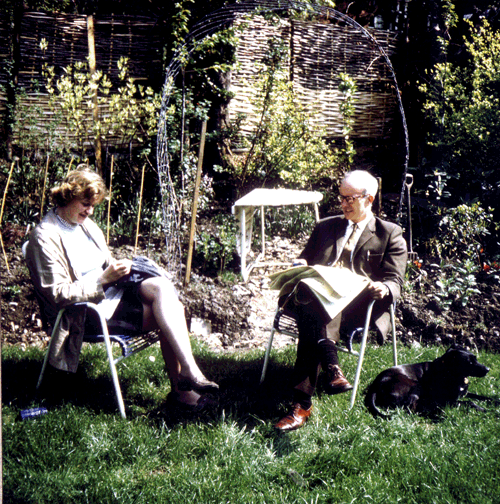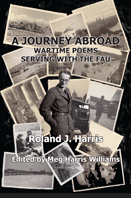ims and history
Roland J Harris
1919-1969
|
'He loved humanity, nature and the sea'
Werner Wolf
'He was an inspired teacher, and the many textbooks he wrote concentrated on the development in the student of the capacity to read in both a comprehensive and a penetrating way'
Donald Meltzer
'Travelling to school each day in his van was a liberal education in itself'
Jack Whitehead |

Mattie and Roland Harris in their London garden, c. 1968
Key Pedagogic Thinkers: R. J. Harris Journal of Pedagogic Development, 2013 click here
|

A Journey Abroad:
Wartime Poems
Serving with the FAU
|
'Growth is the principle of our beauty,
striving to speak the inward sense of things'
Roland Harris
Poems click here
|
Roland Johnston Harris was a poet and English teacher. He was a sincere pacifist and during the Second World War joined the Friends Ambulance Unit. He was with the FAU at the liberation of Belsen, and from that point, during the immediate postwar years, worked to reunite families and displaced persons. His poetry dates mainly from this period.
He then taught English in London secondary schools. As deputy head of Woodberry Down Comprehensive, he established with his wife one of the first Schools Counselling services (the project is documented in Martha Harris' collected papers, The Tavistock Model - click here; for the first Tavistock lecture click here). For a history of Woodberry Down School by fellow-teacher Jack Whitehead, click here. Harris's PhD (1962), conducted at London University, was an empirical study of the usefulness of teaching formal grammar in the early secondary school years, which radically changed methods of English language teaching in schools; it offered an alternative approach to enabling fluency in language structures which he termed 'A grammar of situation' (click here). The thesis continues to be much cited by educationalists, both for its content and its research methodology. To download the thesis click here. For a discussion click here. To read 'Key Pedagogic Thinkers: R. J. Harris' click here.
For a period Harris worked for the Schools Council and was instrumental in raising the school-leaving age to 16. His extensive administrative experience, in addition to his innovative teaching methods, greatly facilitated Martha Harris's construction of the Child Psychotherapy training at the Tavistock Institute in the 1960s.
For the last two years of his life, he taught psycholinguistics at Brunel University. During that same period he had analysis with Wilfred Bion, which ended when Bion moved to California, and in the opinion of Martha Harris had a considerable influence on encouraging Bion's plunge into fictional mode with A Memoir of the Future. Donald Meltzer identifies the main ideas that informed the teaching methods of Roland and Martha Harris with Bion's concept of 'learning from experience':
'The central conviction, later hallowed in Bion's concept of "learning from experience", was that the kind of learning which transformed a person into a professional worker had to be rooted in the intimate relations with inspired teachers, living and dead, present and in books.'
Donald Meltzer read more (for a discussion of 'Educational principles' click here)
Roland Harris was also a keen sailor, and kept a yacht on the Blackwater estuary on which summer holidays and weekends were spent. His death aged 50 was sudden and unexpected. His intention to seriously resume writing poetry was not fulfilled, although he left in manuscript a series of three practical workbooks for teenagers called The Craft of Verse, designed to enable the reading and writing of poetry, later published in a much abridged format as Poetry for You (1986) click here.
|
Writings and publications
(as R. J. Harris)
The attitude to poetry of boys between the ages of eleven and fifteen (1953-54), MA thesis, University of London
'Poetry uninterests me' (1955), The Use of English, 7 (2), 99-103 click here
Descriptive writing for beginners (1957), The Use of English, 9 (1), 9-12 click here
The organisation of English in the secondary modern school (1958), The Use of English, 10 (2), 78-84 click here
Debasement of the language (1959), The Use of English, 11 (2), 88-91
The teacher (1960), The Use of English, 11 (3), 181-83 click here
An experimental inquiry into the functions and value of formal grammar in the teaching of written English to children aged twelve to fourteen (PhD dissertation: Institute of Education, University of London, 1962); click here. To download click here. Summarised in an article in The Use of English, click here
The only disturbing feature... (1965), The Use of English, 16 (3), 197-202 (summarises his PhD research on the teaching of grammar) click here
The education of the teacher of English (1966), The Use of English, 18 (2), 114-121 click here
Review of five books on language (1967), The Use of English, 18 (3), 258-60 click here
Articles in Yachting Monthly
Your English (with Denys Thompson), a series of 5 school textbooks, Heinemann, 1962-65
Abridged versions of several classic novels for children with reading difficulties
Poetry for You (short version of The Craft of Verse); published posthumously (Hutchinson, 1986) click here
Hygeia and the newcomer - a poetic birth story, 1954 click here
The New Ghost - a Brechtian school play click here
Tales retold for children click here
The school as counsellor (1968) - the first lecture in the Tavistock Schools' Counselling Course (pdf also includes Co-operation and the growth of the child (c. 1960) click here
POEMS
A Journey Abroad: Wartime Poems Serving with the FAU (edited by Meg Harris Williams, 2018) click here
Selected Poems (selected by Martha Harris, Clunie Press, 1970) click here
Sonnetinas (Edinburgh, 1971) click here
A portrait in poems click here
|
|


